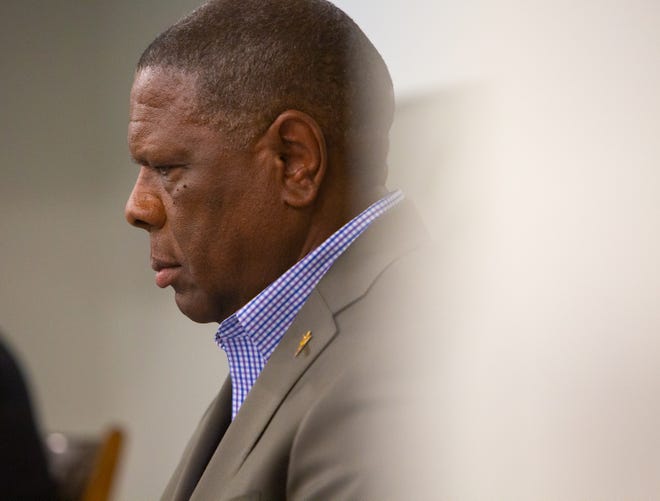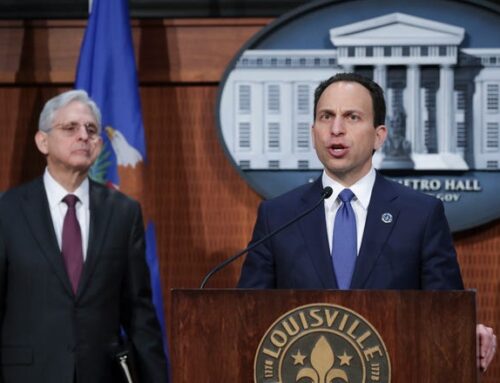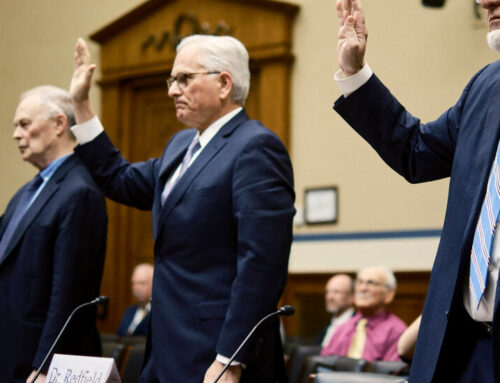
In his pitch to Phoenix City Council District 6 voters for the March 14 runoff election, political newcomer Kevin Robinson plays up a) his longtime experience in law enforcement and b) that he’s a centrist who can bridge differences.
The latter remains to be seen. There’s little history to assess his political leanings or beliefs.
Robinson’s sometimes tentative and perfunctory answers in debates – “I can promise that voters will always get a call back from me” – reflect that lack of knowledge of city hall inner workings.
What does give him a leg up against Sam Stone, a former chief of staff for term-limited City Councilman Sal DiCiccio, is his insight on police issues. Some of those issues are front and center for the Phoenix City Council and may just propel Robinson into office.
Robinson is actually a police reformer
Critics dismiss Robinson as a status quo or “pro-police” candidate – a similar descriptor is assigned to attorney Kesha Hodge Washington, who’s challenging incumbent Carlos Garcia, a community activist, in the District 8 runoff – because he’s backed by law enforcement groups.
But that’s selling him short.
In the law-enforcement arena, Robinson is really a centrist – perhaps even progressive – reformer.
A couple of instances highlight his work for change.
More from Kwok:Could Sam Stone beat the odds and win?
Robinson was part of a task force commissioned by the Arizona Supreme Court to reevaluate unannounced search warrants, or so-called “no-knock” warrants, following the 2020 police killing of Breonna Taylor in Louisville, Ky., during a forced entry drug investigation.
The task force recommended changes to the process, including a list of factors that a magistrate should weigh before granting “no-knock” and nighttime search warrants. That includes the presence of weapons or hostages or known violence from occupants at the location.
The task force also recommended that a police supervisor’s approval of the search warrant be taken into consideration by the magistrate.
Presiding judges and the Arizona Judicial Council, which have the authority to fashion the rules, went further and made the supervisor approval a requirement – which Robinson favored and said was a best practice during the time he oversaw the SWAT unit.
He supported Phoenix’s civilian review board
The second occurred in spring 2020 when the mayor and council first tackled the idea of a civilian review board on police misconduct. Robinson backed Carlos Garcia’s proposal that, on a narrow 5-4 vote, created a civilian office with investigative powers.
At the time, he called it a needed response to lost public confidence in law enforcement and said that police should welcome citizen oversight, not fear it.
‘180 degrees different’:Robinson, Stone square off in debate
The Legislature has since enacted a law that prevents a civilian-led entity from investigating police misconduct. Phoenix’s Office of Accountability and Transparency has, as a result, been relegated largely to a role of keeping watch on internal police investigations.
Nevertheless, Robinson maintains that police officers “should not be afraid of accountability” from citizen oversight.
By comparison, Stone derides the civilian office as “a jobs program for people who have made a living protesting cops” and bristles at the notion that the system for investigating and punishing bad police behavior needs reform.
His public safety experience gives him an edge
The issue of law enforcement looms large in Phoenix not just because of perennial concerns over crime and police staffing but also because of an ongoing Department of Justice investigation into Phoenix Police over claims of civil rights violation, including excessive use of force and discrimination.
Phoenix Police are expected to initiate some reforms on their own even before the DOJ probe finishes, as it has begun to do with a proposed update to their Use of Force policy.
Robinson could influence changes there, having chaired Phoenix Police’s disciplinary review board for more than a decade and headed the department’s use of force board for three years.
He serves on AZPOST, which investigates law enforcement misconduct and disciplines officers, up to revocation of the officer’s certification.
Robinson stands to be a strong ally of the mayor to guide the city in the aftermath of the DOJ investigation.
He also could act as a foil to police critic Carlos Garcia should Garcia win reelection. Who knows, the two might even find common ground to strike a compromise.
On myriad issues, Stone’s experience as Sal DiCiccio’s right-hand person trumps Robinson. On public safety, Robinson has a clear edge.
Reach Abe Kwok at [email protected]. On Twitter: @abekwok.


